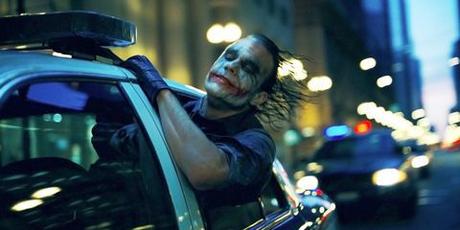A Decade Later Christopher Nolan's 'The Dark Knight' Remains A Peerless Piece of Cinema Gold
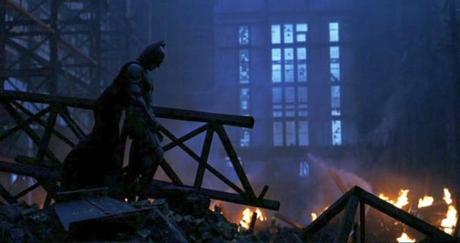
At the risk of sounding like Abe Simpson shaking his fist at a cloud, I sometimes rail against how easy our society's movie consumption options have become. VOD, Netflix, HULU, Amazon, iTunes...all of these services and more have made it easy to experience cinema in the comfort of our own homes. With movie ticket prices regularly increasing and a large part of society seemingly allergic to going outdoors, the concept of an actual movie theater experience has become quaint and antiquated.
As a man nearing his fourth decade of life, I find this fact disheartening. No matter how good a surround sound system you have, no matter how wide your television screen, no matter how many Ks of resolution you possess, NOTHING compares to a true cinematic experience in a movie theater. There's something magical about sitting down in the dark amidst dozens, sometimes hundreds of other paying customers each with their tubs of popcorn and their economy size soft drinks. Every time those lights dim, there's the distinct possibility of watching something truly special. It's a communal experience that no living room home theater system can top.
Each time I see a particularly good piece of cinema, a Logan or a Shape of Water, the communal theater experience is palpable. It's almost as if the theater audience becomes one entity, as the film bends the collective group to its will. This may sound hyperbolic but I've seen it happen on numerous occasions.
Such was the case ten years ago when I hit up the midnight show of director Christopher Nolan's The Dark Knight. The hype machine had been building for months regarding the film, going as far back as January 2008 with Heath Ledger's untimely death. I loved Nolan's Batman Begins (still do), and with each successive preview for TDK, I grew more intrigued. In an age where too many previews give away the entire plot of the film, Nolan's The Dark Knight managed to build anticipation without really showing anything.
From the moment the film opened until the final closing shot, Nolan's The Dark Knight had the packed theater I was in completely in its grasp. I knew within five minutes that I was watching something truly special. My claps were among the loudest during the standing ovation as the film concluded, and I knew I'd be seeing the film again in the very near feature.
Ten years and almost twenty Marvel films later, The Dark Knight remains better than any superhero film the MCU has put out. That's not an indictment of Marvel or Disney by any stretch of the imagination. All, at the bare minimum, have been watchable and some, like this year's Black Panther, have been downright fantastic. Yet the difference between all of the MCU films and The Dark Knight is that TDK isn't just a great comicbook film, it's a great film PERIOD. There's a reason the Oscar nominations expanded to allow ten films the year after The Dark Knight was released. The Academy knew it screwed up not nominating The Dark Knight for Best Picture that year. I mean check out the nominees in 2008: The Curious Case of Benjamin Button, The Reader, Frost/Nixon, Slumdog Millionaire, and Milk. You could make the case that TDK was better than all of those films. At the very least it deserved a nomination.
But I digress.
So what makes The Dark Knight a landmark cinematic achievement a decade after it premiered in theaters?
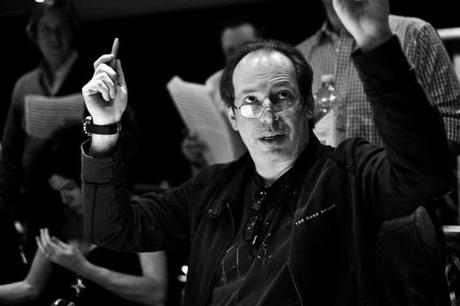
In my estimation when it comes to film composers, there's John Williams, there's Hans Zimmer, and then there's everyone else. If you want an idea of Zimmer's greatness you only have to look at the fact that one of his first solo scoring acts was 1988's Rain Man for which he received his first Academy Award nomination. In a career that spans four decades, Zimmer's composed music for over 150 movies, winning the Oscar for 1994's The Lion King. Zimmer's score for The Dark Knight remains nothing less than breathtaking. Whether it's the opening bank heist scene that starts with a slow eerie rhythm and explodes into action when the car pulls up to pick up the Joker, or the percussive almost operatic police chase with Harvey Dent, Zimmer's score captivates and ranks up there with classic scores like John Williams' Superman or Nino Rota's The Godfather. The fact that Zimmer failed to even garner an Oscar nomination remains a mystery.
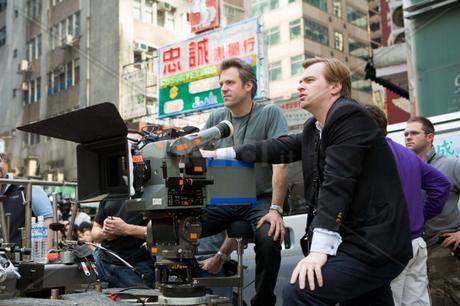
It's hard to imagine that a cinematographer who won an Oscar for Inception began his career shooting a film, Stepmonster, that holds a 0% on Rotten Tomatoes, but then again everyone has to start somewhere. A longtime collaborator with Christopher Nolan going back to his Memento days, Wally Pfister's cinematography in The Dark Knight is nothing short of brilliant. Whether it's the opening bank heist which possesses all the grandeur and spectacle of James Bond or an intimate shot of Bruce Wayne sitting in a chair crying after the death of Rachel, Pfister maximizes on Nolan's vision, telling a story that manages to be both personal and epic in scope at the same time. In recent years Pfister has turned his eye towards directing with 2014's Transcendence and even an episode of the new The Tick television show. It's been six years since he had cinematographer duties and I sincerely hope he steps into that role again in the near future.
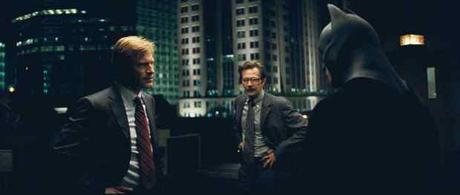
I think one of the (many) appealing aspects of Batman, is that he's a believable superhero. He doesn't possess heat vision or flight like Superman, he's just a regular guy with psychological scars that leads him to a career as a caped crime fighter. Well as regular as a billionaire can be anyway. The point is that given enough training and focus (and money) ANYONE could be Batman. What screenwriters Jonathan Nolan, Christopher Nolan, and David S. Goyer did with The Dark Knight was make a grounded Batman film. Rather than the campy Adam West shtick of the 1960s or the Gothic and off-kilter tone of Burton's films, The Dark Knight feels very realistic. There's a verisimilitude that permeates the film as evidenced by Bruce sewing himself up after an encounter with criminals or using ballistics technology to track down a suspect. This gritty realism adds a layer of authenticity that makes The Dark Knight a joy to watch. There's also a cultural relevance as the story addresses terrorism. The Joker at his most basic IS a terrorist and the film poses the question, how far do you go to catch a terrorist? In the case of Batman, he's willing to tap into every cell phone in Gotham in order to pinpoint the Joker's location. Ten years after it's release, the notion of privacy and personal freedom versus safety and the "greater good," remains a very relevant social topic.
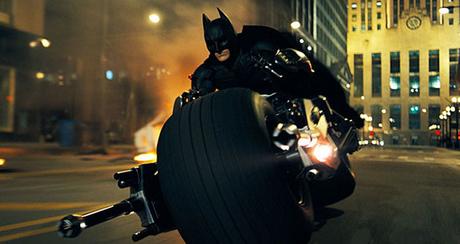
In an age where CGI rules the day at the box office, it's a special treat when I see a film that leaves me saying, "How the HELL did they do that?" The action in The Dark Knight made me feel that way. In fact it would be another seven years when George Miller's Mad Max: Fury Road released that I felt that way about a film. Whether it's Joker blowing up a hospital or Batman kidnapping a Chinese accountant from a skyscraper in Hong Kong, every action sequence in The Dark Knight is superb. There's an attention to detail, a meticulousness, and even a subtlety that directors like Michael Bay have never understood. The scene where Harvey Dent (Aaron Eckhart) is used as bait to entice the Joker to attack, is one of the best car chase scenes in the history of cinema. I mean Nolan went all out with that sequence, everything from flipped cars to the Batcycle emerging from the wreckage of the Batmobile. And to cap it off with the reveal that James Gordon (Gary Oldman) is still alive? Pure genius.
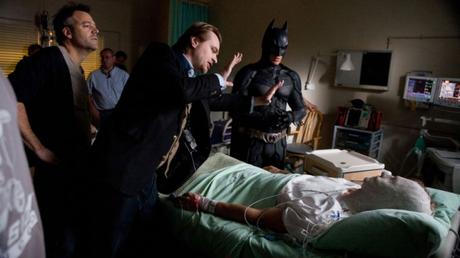
How the Hell do we live in a world where Christopher Nolan still hasn't won an Oscar for Best Director? The man is a talent on par with legends like Spielberg, Scorsese, and Tarantino. In my mind he's reached that rare air of directors where I'll watch whatever he puts out. Even lesser Nolan ( Insomnia, Dunkirk) is still pretty awesome. As much as I love Inception and Interstellar, The Dark Knight remains Nolan's magnum opus. It's a Master's class in direction. It's a big budget film that at times veers into the realm of art house film making, and I mean that in the best way possible. Nolan deftly manages intense dramatic sequences with large-scale action scenes again and again in The Dark Knight. I can't tell you the number of times people have told me that their favorite scene in TDK was when the Joker shows up in full regalia to address Gotham's criminal underworld. Other than the infamous pencil part, the scene is literally just a group of guys talking at a table. Yet the scene's subtext and nuance holds up against any other part in the film. Furthermore, Nolan knew when to just step back and let his actors go at it such as the interrogation room scene between Batman and Joker. Which brings me to my final point...
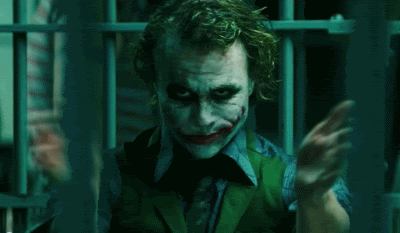
With films like Lords of Dogtown and Brokeback Mountain already under his belt before he took on the role of the Clown Prince of Crime, audiences knew the kind of talent Heath Ledger possessed. However, I don't think anyone was prepared for the kind of performance we received with The Dark Knight. The brilliance of Ledger's Joker lies in how grounded the part was. As crazy and eccentric as his performance is, Ledger's Joker always feels like a terrorist that could step out of the screen and into the real world. His character is a refutation of a fundamental belief that Batman holds dear; namely that "criminals aren't complicated" and that they all have some inner motivation for their activity, whether it be power, greed, or something else. That's just not the case with Ledger's Joker. He's literally an "agent of chaos" capable of torching a mountain of money just to prove a point. In many ways he's like Schwarzenegger's terminator. You can't bargain with him, you can't reason with him, and you can't physically beat him into submission. And you can't help but love the social experiments he engages in, whether it's on the personal level (Rachel and Harvey's kidnapping) or a societal level (the Gotham ferries rigged with explosives). Joker holds a mirror up to the face of our culture and asks us what kind of society we are. It's the kind of thing that elevates The Dark Knight above the level of the mere "comic book movie." From a cinematic fan point of view, I will forever lament Ledger's untimely death. Who knows how many brilliant performances audiences could have experienced in the subsequent ten and a half years since his death? And as much as I love The Dark Knight Rises, I'll always wonder what that film would have been like with Ledger returning as the Joker.
Often times the mark of a good movie is how well it stands the test of time. Forty-three years later Jaws still holds up as a movie classic. The Dark Knight is of the same ilk. After ten years it in no way feels any less timely, relevant, fascinating, or entertaining. It remains, and will remain, a timeless classic that audiences will enjoy for decades to come.
You can follow me on Twitter at @DarthGandalf1